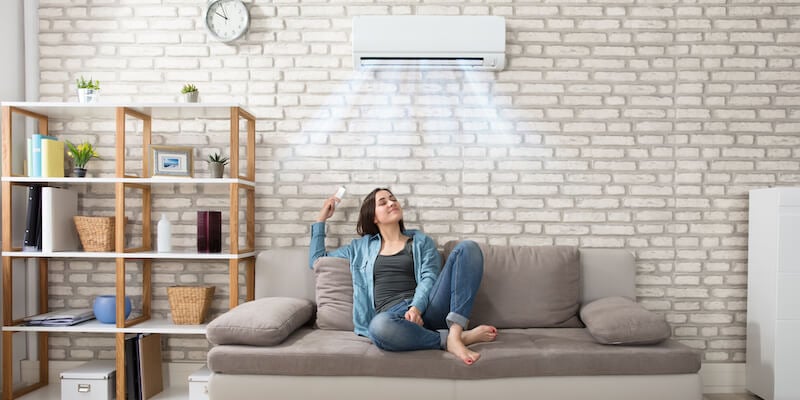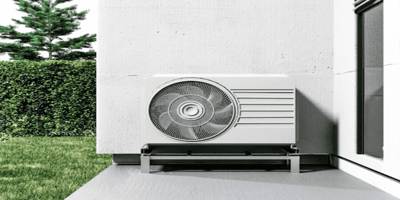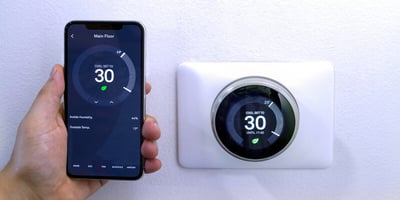Complete Guide to Air Conditioning Modes and Settings
Air conditioners have so many modes and settings, it’s hard to completely understand exactly what each of these does. Unless the person installing your AC sat you down and carefully explained what each mode is, or you took the time to sit down and carefully read the manual (which most people don’t), then all those modes and settings might as well be a long-lost ancient language.
Consider us your one and only ancient language translation service, because we are about to unlock the key to your knowledge of these settings.
Shall we begin decoding?
Overview of All Air Conditioner Settings
Cool Mode: The Foundation
Cool mode serves as your AC's most straightforward function - pure, direct cooling when temperatures climb beyond comfort. Think of this as your system's primary job: moving heat from inside your home to the outside world through the refrigeration cycle.
Your compressor works steadily, fans spin at your chosen speed, and the temperature drops predictably. This directness makes cool mode perfect when you walk into a sweltering house after vacation or need to counteract the afternoon sun blazing through windows. The trade-off? Your electric meter spins faster because the system runs at full capacity until reaching your set temperature.
Most people start here, but understanding cool mode's limitations led engineers to develop more nuanced approaches.
Heat Mode: The Reverse Engineer
Heat mode flips everything backwards - literally. The same refrigeration system that removes heat during summer now pulls warmth from cold outdoor air and pumps it inside. Even when outdoor temperatures drop to 20°F, heat pumps extract surprising amounts of energy from that "cold" air.
The clever part: moving heat requires far less energy than creating it. Your heat pump delivers 2-3 times more warmth per electricity dollar compared to baseboard heaters or space heaters. Cold-air prevention stops the fan from blowing until the coils warm up, so you never get that unpleasant blast of cool air when heating starts.
Heat mode works beautifully until outdoor temperatures plummet below your system's capacity, which brings us to the next evolution in AC thinking.
Dry Mode: The Humidity Hunter
Dry air conditioner setting emerged from a simple observation: sometimes the air temperature feels fine, but everything feels sticky and uncomfortable. High humidity makes 78°F feel like 85°F, so rather than cranking down the temperature, dry mode tackles moisture directly.
The system runs its compressor in short, controlled bursts - just enough to condense water from the air without over-cooling your space. You might notice the temperature drops a degree or two, but removing that clammy feeling makes the room dramatically more comfortable. Coastal homes and areas with heavy summer rains find this mode invaluable.
Dry mode also prevents the mold and mildew that thrive in humid conditions, protecting both your health and your home. But what happens when you need even less intervention?
Fan Mode: The Minimalist
Fan air conditioner setting strips everything down to basics - just air movement, nothing more. Your outdoor unit stays silent while the indoor fan circulates air throughout your space. During those pleasant evenings when outdoor temperatures finally drop, fan mode can make your home comfortable using less electricity than a light bulb.
This mode also serves as the perfect transition. After cooling your home, switching to fan mode distributes the remaining cool air without continuing to run the energy-hungry compressor. Many people discover fan mode accidentally, then realize how often they actually need simple air circulation rather than active cooling.
Fan mode taught manufacturers that people wanted their AC systems to think more intelligently about when to apply cooling power.
 Auto Mode: The Decision Maker
Auto Mode: The Decision Maker
Auto mode represents the logical next step: why should you constantly choose between cooling, heating, and fan modes when your AC could make those decisions for you? This mode continuously monitors your room temperature and compares it to your desired setting, then automatically selects the most appropriate response.
Set your target at 75°F, and auto mode handles the rest. Room too warm? It switches to cooling. Temperature drops below your setting? Heat mode kicks in. Perfect temperature but stuffy air? Fan mode takes over. The system even adjusts fan speeds based on how far the current temperature drifts from your target.
Auto AC setting requires patience - it pauses for 15 minutes between mode changes to prevent constant switching. But this intelligent operation laid the groundwork for even smarter energy management.
Eco Mode: The Efficiency Expert
Eco mode takes auto mode's intelligence and adds a crucial element: energy consciousness. Instead of demanding perfect temperature control, eco mode accepts small variations in exchange for substantial energy savings.
Here's how it thinks differently: rather than running the compressor continuously until hitting exactly 72°F, eco mode might cool to 71°F, let the temperature drift to 74°F, then cycle back on. This gentle approach can cut your electricity usage in half while maintaining comfortable conditions.
Variable-speed compressors in 2025 models make eco mode even more sophisticated. Instead of simple on/off cycling, these systems can run at 40% capacity when you need light cooling, ramping up to 100% only when necessary. The result feels like steady, consistent comfort while your electricity meter barely notices the difference.
Eco mode works best when you prioritize long-term savings over immediate temperature changes - perfect for daily operation when you're home and active.
Sleep Mode: The Night Shift Specialist
Sleep AC setting recognizes that your body's needs change dramatically once you lie down for the night. Your metabolism slows, your body temperature naturally drops, and that perfectly comfortable daytime temperature starts feeling too cold.
Rather than maintaining a constant 72°F all night, sleep mode gradually warms the room by 2-3 degrees over the first hour or two. This matches your body's natural temperature regulation, helping you sleep more soundly while using 20-25% less energy than constant cooling.
The fan automatically shifts to quieter speeds, and the entire operation becomes nearly silent. After 6-8 hours, sleep mode typically switches off or returns to your normal settings, assuming you'll wake up and prefer active climate control again.
Sleep mode proves that comfort doesn't require constant intervention - sometimes gentle, gradual changes work better than rigid temperature control.
Turbo Mode: The Emergency Response
Turbo mode exists for those moments when subtlety won't work - when you need maximum cooling or heating power immediately, regardless of energy consumption or noise levels. Your compressor runs at peak capacity, fans spin at maximum speed, and the system delivers everything it's capable of.
Think of turbo mode as your AC's sprint setting. Just as runners can't maintain top speed indefinitely, most systems limit turbo mode to 30-60 minutes to prevent equipment damage. You can't adjust temperature or fan speeds during turbo operation - the system assumes you want maximum performance, period.
Turbo mode typically uses 50-60% more electricity than standard cooling, but it can drop indoor temperatures twice as fast. Perfect for cooling a house that's been closed up during vacation or providing quick relief during extreme heat waves.
The existence of turbo mode highlights an important principle: different situations demand different approaches, and the best AC systems provide options for every scenario.
Air Conditioner Modes Comparison Overview
 Next, for those who prefer more visual clarity (not boring reading, haha), we gathered and strategically structured data below regarding AC settings performance metrics, comfort level, cost, environmental impact, optimal usage, and so on, with explanations of each number and word. Enjoy!
Next, for those who prefer more visual clarity (not boring reading, haha), we gathered and strategically structured data below regarding AC settings performance metrics, comfort level, cost, environmental impact, optimal usage, and so on, with explanations of each number and word. Enjoy!
Quick Reference Table
|
Mode |
Primary Function |
Energy Consumption |
Comfort Level |
Best Use Case |
Noise Level |
Temperature Control |
|---|---|---|---|---|---|---|
|
Cool |
Active cooling via refrigeration cycle |
High (100% baseline) |
Excellent |
Hot days, rapid cooling |
Moderate |
Precise (±1°F) |
|
Heat |
Reverse cycle heating from outdoor air |
Moderate (75-90% of cooling) |
Excellent |
Cold weather, energy-efficient heating |
Moderate |
Precise (±1°F) |
|
Dry |
Humidity removal with minimal cooling |
Low-Moderate (60-75% of cooling) |
Good |
Humid conditions, monsoon season |
Low |
Loose (±2-3°F) |
|
Fan |
Air circulation only |
Very Low (10-15% of cooling) |
Basic |
Mild weather, air movement |
Low |
None |
|
Auto |
Intelligent mode switching |
Variable (depends on conditions) |
Excellent |
Variable conditions, minimal intervention |
Variable |
Adaptive (±2°F) |
|
Eco |
Optimized efficiency with comfort balance |
Low (50-75% of standard cooling) |
Good-Excellent |
Daily use, energy savings priority |
Low-Moderate |
Flexible (±2-3°F) |
|
Sleep |
Gradual temperature adjustment for rest |
Low (75-85% with efficiency gains) |
Excellent |
Nighttime operation |
Very Low |
Progressive adjustment |
|
Turbo |
Maximum capacity operation |
Very High (140-160% of standard) |
Excellent |
Emergency cooling/heating |
High |
Rapid achievement |
Detailed Performance Metrics of AC Settings
Energy Consumption Analysis (Based on 12,000 BTU Unit)
Standard Cool Mode: 1,200-1,500 watts/hour
- Peak operation for fastest results
- Consistent power draw until target reached
Eco Mode: 600-1,125 watts/hour (25-50% savings)
- Intelligent compressor cycling
- Variable speed operation when available
Dry Mode: 720-1,125 watts/hour
- Intermittent compressor operation
- Focus on moisture removal efficiency
Fan Mode: 120-225 watts/hour
- Indoor unit only operation
- Comparable to ceiling fan consumption
Turbo Mode: 1,680-2,400 watts/hour
- Maximum component utilization
- Short-duration high consumption
AC Modes Comfort Level Breakdown
Cooling Effectiveness Scale (1-5 stars)
- Cool Mode: ⭐⭐⭐⭐⭐ (Maximum cooling power)
- Eco Mode: ⭐⭐⭐⭐ (Balanced cooling with slight variations)
- Auto Mode: ⭐⭐⭐⭐⭐ (Adaptive comfort maintenance)
- Dry Mode: ⭐⭐⭐ (Limited cooling, excellent humidity control)
- Fan Mode: ⭐⭐ (Air movement only)
- Sleep Mode: ⭐⭐⭐⭐⭐ (Optimized for rest comfort)
- Turbo Mode: ⭐⭐⭐⭐⭐ (Rapid comfort achievement)
Humidity Control Effectiveness
- Dry Mode: Excellent (Primary function)
- Cool Mode: Good (Secondary benefit)
- Eco Mode: Moderate (Dependent on cycling)
- Auto Mode: Variable (Mode-dependent)
- Other Modes: Minimal to none
Cost Impact Analysis (Monthly Operation Estimates)
Based on 8 hours daily use, $0.14/kWh average electricity rate
|
Mode |
Daily Cost |
Monthly Cost |
Annual Savings vs Cool Mode |
|---|---|---|---|
|
Cool Mode |
$1.34-$1.68 |
$40-$50 |
Baseline |
|
Eco Mode |
$0.67-$1.26 |
$20-$38 |
$240-$360 |
|
Dry Mode |
$0.81-$1.26 |
$24-$38 |
$192-$312 |
|
Auto Mode |
$0.95-$1.45 |
$29-$44 |
$132-$180 |
|
Sleep Mode |
$1.01-$1.43 |
$30-$43 |
$120-$252 |
|
Fan Mode |
$0.13-$0.25 |
$4-$8 |
$432-$504 |
Environmental Impact Comparison
Carbon Footprint Reduction
- Eco Mode: 25-50% reduction in CO₂ emissions
- Dry Mode: 15-40% reduction during applicable conditions
- Fan Mode: 85-90% reduction (minimal electrical consumption)
- Sleep Mode: 15-25% reduction during nighttime hours
- Auto Mode: 10-35% reduction (condition dependent)
Resource Conservation Benefits
Eco and Sleep Modes extend equipment lifespan through:
- Reduced compressor cycling frequency
- Lower operational stress on components
- Decreased maintenance requirements
- Extended replacement intervals
Optimal Usage of AC Modes Strategies by Situation
High Efficiency Priority
- Primary: Eco Mode (daily operation)
- Secondary: Sleep Mode (nighttime)
- Supplementary: Fan Mode (mild conditions)
Maximum Comfort Priority
- Primary: Cool/Heat Mode (active conditioning)
- Secondary: Auto Mode (variable conditions)
- Emergency: Turbo Mode (rapid adjustment)
Balanced Approach
- Daily: Eco Mode (energy conscious comfort)
- Night: Sleep Mode (optimized rest)
- Transition: Auto Mode (seasonal changes)
- Extreme: Cool/Turbo Mode (demanding conditions)
Smart Choices of Air Conditioner Settings
The key to AC satisfaction lies in matching modes to situations rather than sticking with one setting. Start with these approaches:
Daily Operation: Eco mode handles most situations beautifully. Set your preferred temperature and let the system optimize energy use while maintaining comfort.
Temperature Emergencies: Cool mode for rapid relief when arriving home to extreme heat. Turbo mode when you need maximum performance immediately.
Seasonal Transitions: Auto mode excels during spring and fall when daily temperature swings make manual adjustments tedious.
Humidity Problems: Dry mode during rainy periods or humid summer stretches when temperature feels fine but air feels sticky.
Sleep Quality: Sleep mode for bedrooms - the gradual temperature changes and quiet operation improve rest while cutting energy costs.
Mild Weather: Fan mode during pleasant evenings when you need air movement but active cooling wastes energy.
Maintenance Matters: Clean filters monthly regardless of mode choice. Clogged filters force every mode to work harder, reducing both comfort and efficiency.
Temperature Strategy: Set cooling between 75-78°F for the best balance of comfort and economy. Each degree lower increases energy use by 6-8%.
Decoding Your Remote: Symbol Guide
![]() Your AC remote looks like a puzzle of cryptic symbols, but each icon tells a simple story. Once you crack the code, controlling your system becomes intuitive.
Your AC remote looks like a puzzle of cryptic symbols, but each icon tells a simple story. Once you crack the code, controlling your system becomes intuitive.
The Basic Mode Symbols
❄️ Snowflake: Cool mode lives here. The universal symbol for "make things colder" - as straightforward as symbols get. Press this when you need active cooling.
☀️ Sun: Heat mode's bright, cheerful icon. Even when snow covers the ground outside, this little sun reminds you that warmth is just a button press away.
💧 Water Drop: Dry mode's calling card. This drop doesn't mean your AC produces water - quite the opposite. It removes moisture from your air, tackling that sticky feeling on humid days.
🌪️ Fan Blades: Fan mode shows spinning blades or a simple propeller icon. Pure air movement without heating or cooling - your AC becomes a really expensive fan.
AUTO: No fancy symbol needed. Auto mode usually spells itself out because manufacturers want you to find this intelligent setting easily.
The Smart Operation Symbols
🍃 Leaf or "ECO": The eco-friendly badge of honor. This green leaf (or ECO text) signals energy-saving operation. Your wallet and the planet both appreciate this button.
🌙 Moon or "SLEEP": Nighttime mode wears a crescent moon. Some remotes add "ZZZ" symbols to make the message crystal clear. Quiet operation and gradual temperature changes for better rest.
⚡ Lightning Bolt: Turbo mode's power symbol. This jagged bolt means maximum performance, maximum speed, maximum everything. Use sparingly - it's the espresso shot of AC operation.
The Control Symbols You'll Use Daily
▲▼ Temperature Arrows: Up makes things warmer, down makes things cooler. Simple logic that works the same whether you're heating or cooling.
🕐 Clock: Timer functions let you schedule operation. Set your AC to start cooling before you arrive home, or shut off automatically after you fall asleep.
↕️ Swing Arrows: Vertical arrows control up-and-down airflow movement. Horizontal arrows handle left-right movement. These dancing arrows mean your air gets distributed more evenly.
📶 Fan Speed Bars: Usually three or four bars indicating fan intensity. More bars equal more airflow and more noise. Fewer bars mean quieter, gentler operation.
The Less Obvious Helpers
🔄 Circular Arrow: This recycling-style symbol typically controls air circulation patterns or filter reset functions. Check your manual - this one varies between manufacturers.
🏠 House with Thermometer: I Feel mode or zone control. The AC uses sensors to maintain temperature where you actually spend time rather than just near the unit.
📱 Wi-Fi Symbol: Smart connectivity indicator. When this lights up, your AC can talk to your phone, learn your habits, and adjust automatically.
FAQ
1. Which mode saves the most energy: Eco, Auto, or Cool?
Eco mode saves the most energy - cuts electricity use by 25-50%. Auto mode saves moderate energy by switching between modes automatically. Cool mode uses the most power because it runs at full capacity continuously.
Use Eco for daily operation, Auto for changing weather, Cool for rapid cooling.
2. When should I use Dry mode instead of Cool mode?
Use Dry mode when it feels sticky but temperature is acceptable (75-78°F). Dry mode removes humidity using 40% less energy than Cool mode.
Use Cool mode when you need the temperature to actually drop.
3. What's the difference between Auto and Eco mode?
Auto mode maintains exact temperature by switching between heating/cooling/fan automatically. Eco mode allows 2-3°F temperature variation to save energy.
Auto prioritizes comfort, Eco prioritizes savings.
4. Does running my AC in Fan mode actually save money?
Yes - Fan mode uses only 10% of Cool mode's energy. But it provides zero cooling since the compressor is off. Only useful when air temperature is already comfortable.
5. Should I leave my AC on Auto mode all the time?
No. Use Auto mode during spring/fall when weather changes daily. Use Eco mode during consistent hot weather for better energy savings. Switch to Cool/Heat modes when you need immediate temperature changes.






































.png?height=200&name=image_2024-12-09_12-50-26%20(1).png)